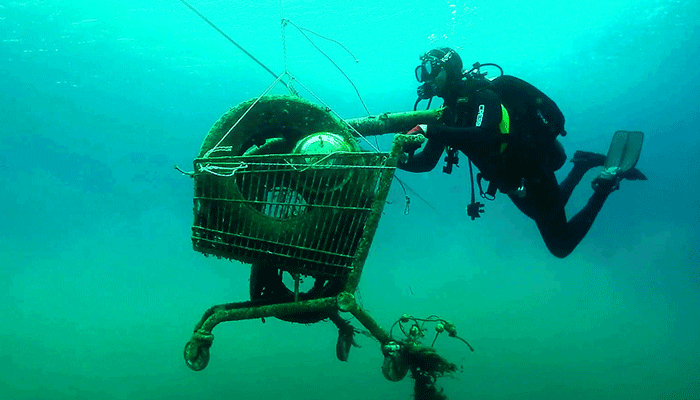Divers in the Mediterranean fight plastic pollution that threatens wildlife
The team collected four tyres, two shopping carts, a street lamp, metal boxes, plastic bags, and dozens of plastic bottles in three hours
ZAKYNTHOS: Dressed in her protective wetsuit and scuba gear, Antigone Kouteri jumps into the murky waters of Zakynthos harbour in search of plastics — and promptly snags her arm on a submerged object.
"It was a tyre," offers her patrol mate Efthymis, coming up with a discarded beer bottle. "My treat!" he jibes.
The Ionian island of Zakynthos is one of Greece's most pristine travel destinations, renowned for its azure waters and fabulous beaches, an environment clean enough to be a major Mediterranean nesting ground sought out by loggerhead sea turtles.
But even here, plastic pollution poses a grave threat to wildlife.
Kouteri is one of nearly a dozen volunteers from Aegean Rebreath, a Greek organisation formed in 2017 to protect Aegean biodiversity from waste.
Within three hours, the team has collected four tyres, two shopping carts, a street lamp, metal boxes, plastic bags, dozens of plastic bottles and several kilometres of fishing line.
"Marine litter is a global issue, so it is (present) in Greece. More than 70 percent of marine litter is plastic in Greece," says Katerina Tsagari, a biologist at the Hellenic Centre for Marine Research near Athens.
Tsagari says her team has found litter, most of it plastic, in about 75 percent of loggerhead sea turtles tested.
Overall, they have found plastic ingestion in between 20 and 45 percent of the species tested, which include fish and mussels.
With a coastline of some 14,000 kilometres (8,500 miles), one of the longest in the southeastern Mediterranean, Greece attracts tens of millions of tourists every year.
It´s a regional problem. The Mediterranean, a partly closed sea, accumulates 570,000 tonnes of plastic annually from surrounding countries, according to the World Wildlife Fund.
WWF has reported that Greece produces 700,000 tonnes of plastic per year, or 68 kilos per capita. Out of that, 11,500 tonnes end up in the sea, it said.
-
Las Vegas father shoots daughter's boyfriend, then calls police himself
-
'Fake' sexual assault report lands Kentucky teen in court
-
Woman arrested months after allegedly staging husband’s murder as suicide
-
Bangladesh sees high turnout in landmark national election
-
Lufthansa cancels hundreds of flights amid pilot and cabin crew strike
-
South Korea ex-interior minister jailed for 7 Years in martial law case
-
UK economy shows modest growth of 0.1% amid ongoing budget uncertainty
-
EU leaders divided over ‘Buy European’ push at Belgium summit: How will it shape Europe's volatile economy?












